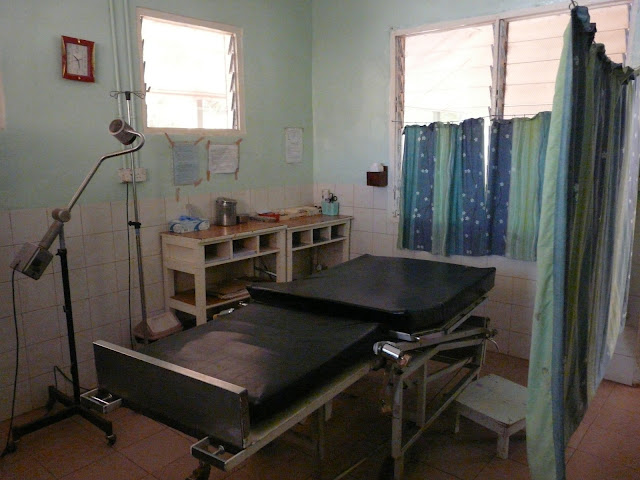Yesterday Karen took me to see her
clinic. It is located just over the road from her compound. It has
taken me a while to get used to the idea of Karen living in a
compound. The term sounds so isolationist and sectarian, as though
the missionaries are segregated from the rest of Gambia and living in
their own little Mini-Europe. Actually, everybody lives in a compound
here. A compound is a family group of houses, maybe an animal shed, a
yard, farming/gardening area in the style of “The Good Life”
although far harder. They are all fenced off from one another in a
variety of ways: sheets of corrugated iron, fence posts, wire
fencing, anything to keep the livestock in at night and the wilder
animals out. Crime is rarely an issue fortunately. Karen's compound
is shared with another missionary family who are currently away. We
are having to feed their cat who is my Sleep Nemesis as it wakes me
up every morning climbing up the mosquito netting outside my window
shouting to be fed. It is only a couple of months old, very sweet but
also demanding of attention in the way that small children usually
are.
Back to the clinic. The clinic consists
of three areas, one where there is an AIDS/HIV clinic; a drop in
centre and a general hospital. The drop in centre is open three
mornings a week and has differing specialities of each day. On Monday
there is a general adult clinic; on Tuesdays pre-natal and Wednesdays
is Infant Welfare. There is a large number of patients, some come
from miles around either walking, taking a bus, donkey cart. In fact,
any way they can. The team of in-house trained nurses assess the
patients, dispense medicine if needed and pass on all cases they are
unsure of to the Doctor on duty. All women are offered an AIDS test
when pregnant and then passed on to the appropriate clinic if the
results demand it. Interestingly I think many of us assume that AIDS
is passed around by promiscuity. I was interested to hear that in
Gambia it is a problem because of the number of wives a man may have,
multiplied by the divorce and remarriage rate. So, if you have three
wives, divorce one, she marries someone else, he already has two
other wives and then divorces one of them who then marries another
man, etc. Can you see how it spreads without any infidelity at all?
The facilities at the hospital are
basic but adequate. Drugs are available, and not stolen unlike some
other hospitals, sterilisation equipment is used, the ward has been
redecorated to be more cheerful. There are two isolation rooms as
well if needed. The delivery suite would make most western women run
in terror but is still far better than the alternatives. At least
Karen's midwives don't beat the women in labour if they make a noise
contrary to the local custom. Records are well kept for future
treatment. So all in all, basic, efficient*, and a place where the
patients are cared for.
*Karen has just added that efficient is
a very good adjective: the hospital spends about £2 per
patient/consultation. The entire hospital costs about £70 000 per
year to treat 35 000 patients.
So, next time I feel inclined to
complain about the NHS, I will be very grateful indeed. Karen's
clinic is good by African standards, and the staff very caring, but
would still be happier to be ill back home.
 |
| This is the maternity delivery room. The hospital has just been rearranged to give women more privacy. |
 |
| The operating theatre. There are only a few surgeries carried out here every year, there used to be more. As Karen says, "Basic, but most of what I would need is here." |



No comments:
Post a Comment